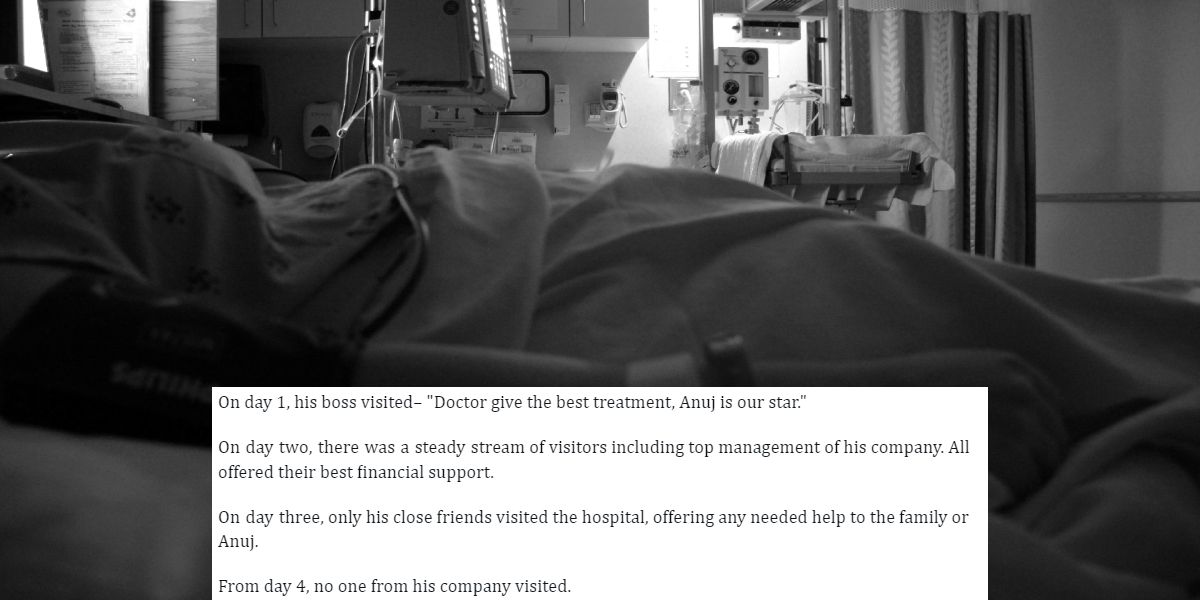Dr Sudhir Kumar, a Hyderabad-based neurologist, shared the story of 33-year-old Anuj, who suffered a brain haemorrhage and lost his job.

Anuj had consulted the doctor for the first time three years ago for headache. (Creative Commons)
It was just another day at the Out Patient Department (OPD) of Apollo Hospitals in Hyderabad when a woman with two kids — aged 3 and 5 — holding her hand and her paralysed husband arrived at the chamber of neurologist Dr Sudhir Kumar.
Arti, the woman, asked: “Doctor, when will my husband Anuj start talking and walking?”
The 33-year-old Anuj was brought into the OPD for review one month after suffering a brain haemorrhage.
A brain haemorrhage is a type of stroke caused by bleeding in the brain. This can occur due to a ruptured blood vessel or an injury to the brain.
Symptoms can include headache, confusion, vision problems, and weakness or numbness on one side of the body.
Brain haemorrhages can be life-threatening and require immediate medical attention.
And Anuj had become paralysed on the right side of his body and lost his speech due to this stroke, said the doctor on Twitter.
Anuj consulted the doctor, Kumar, for the first time three years ago for a headache. On evaluation, his blood pressure (BP) was found to be 160/110 mmHg. A blood pressure level of less than 120/80 mmHg is considered normal.
He told the doctor that had a hectic work schedule of 13-14 hours per day; On average, he slept four-five hours per night. His job required outstation travel for 10-15 days per month.
Anuj told the doctor: “I have breakfast in Hyderabad, lunch in Mumbai and dinner in Cape Town (South Africa). It is rare for me to have all three meals in the same city. I am a valuable employee of the multinational company that I work for, and 300 staff work under my leadership. I earn a handsome salary.”
The doctor said on Twitter: “I offered him a few suggestions: Ensure eight hours of sleep, minimise daily working hours, and eat a healthy diet. I also suggested BP-lowering drugs.”
Anuj replied that he spent 45 minutes at the gym daily, his weight was normal, and he did not like medicines. He added that his BP would return to normal at home and without medication.
Then, on a busy day, Kumar received a frantic call. The voice on the other side said Anuj had severe headache and vomiting, was unable to talk, and could not move his right hand or leg.
The doctor suggested that he be brought to the emergency department (ED).
“In the ED, I recognised him at once, though he had not visited for three years,” he wrote in the Twitter thread.
CT scans confirmed a brain haemorrhage on the left side. And Anuj’s BP was 220/140 mmHg.
The bleed was large and he had to be taken for emergency surgery. Post-surgery, he was kept in the ICU on a mechanical ventilator, said the doctor.
According to the doctor, when Anuj was admitted to the hospital, his boss visited on the first day. “Give the best treatment,” he asked the doctor. “Anuj is our star.”
The next day, there was a steady stream of visitors, including top management of his company. All offered their best financial support.
On the third day, only his close friends visited the hospital, offering any needed help to the family or Anuj.
From Day 4, no one from his company visited.
Anuj made a gradual recovery and was discharged after eight days, said the doctor, adding that he was unable to talk or understand speech.
“He could not stand or walk and was unable to use his right hand. He needed his wife’s help for activities of daily living,” said Kumar.
At the one-month review, Arti mentioned to the doctor that the company had hired someone else in Abuj’s place and they were not sure whether Anuj would be taken back once he recovered, as he might not be able to fulfil his work duties.
The family was already facing financial troubles, said Kumar.
Eventually, Arti managed to find a job, whose wages were barely enough to take care of the family’s needs.
“She could somehow manage to juggle her job, [and] taking care of Anuj and her two children,” said the doctor.
All the “well-wishers” from his company and among his acquaintances were nowhere to be seen.
The doctor said that work-life balance is essential. “Hectic working hours, less sleep, and stress are detrimental to health,” said Kumar.
He added that high BP needed drugs if non-drug measures failed.
Periodic checkups for BP, blood sugar, and cholesterol are needed even if one goes to gym or does exercises, he added.

May 18, 2024

May 18, 2024

May 18, 2024

May 18, 2024

May 18, 2024

May 18, 2024